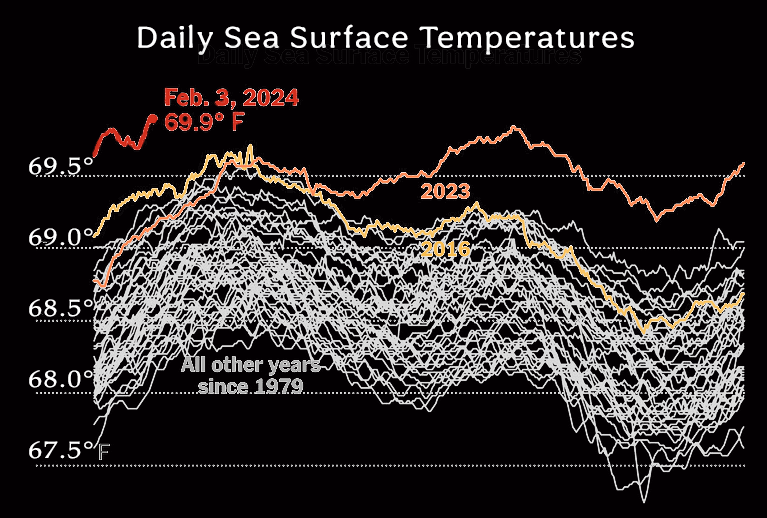
David Gelles bravely titles his Climate Forward article in the New York Times, “Scientists are Freaking Our About Ocean Temperatures.” It would have been every bit as accurate, but possibly less acceptable, if he had said scientists are freaking out about climate change or global warming rather than “ocean temperatures.” But, since much of the warming that we’re causing is being absorbed by the oceans, ocean temperatures are a proxy for global warming. They took a gob-smacking leap up this year, shifting the historic pattern of more gradual increases.
This astonishing leap follows a record hot January and one of the longest runs of record-breaking summer temperatures the world has ever seen (shown in the above chart in pale orange). As a function of this, ocean temperatures are now in unknown territory, as shown by the red line in the graph above, reflecting readings for 2024.
Scientists have hypotheses as to what might have caused such a dramatic shift. To understand some of what the world’s top scientists are thinking, we recommend you read “Global warming in the pipeline,” by James E. Hansen, Makiko Sato, Leon Simons and other scientists, published in September 2023 by Oxford University Press, if you are capable of following deeply scientific, dense analysis. Alternatively, Dr. Hansen and his CSAS team sent a thank you memo to supporters in February, with something of a summary of the conclusion from the Pipeline paper. You can read this entire memo here, but we quote the following paragraph:
In Pipeline, among other things, we show that climate sensitivity is higher than IPCC’s best estimate and human-made aerosols are a larger climate forcing that is driving global warming acceleration. A stunning global change now underway is darkening of Earth (Fig. 1). Earth’s albedo (reflectivity) decreased since 2015 by an amount that has an effect on global temperature equivalent to a CO2 increase of more than 100 ppm. This darkening has doubled Earth’s energy imbalance and thrown into a cocked hat official claims about achieving climate targets. These facts make it more difficult, but not impossible, to secure a propitious climate for future generations.
Gelles also tries to answer the question of what’s driving the heat. He writes: “Global warming, caused by the burning of fossil fuels, has been driving up global temperatures on land and in the sea for decades now. Over the past year, worldwide average temperatures were more than 1.5 degrees Celsius, or 2.7 degrees Fahrenheit, higher than before the industrial age. New data from a variety of sources has led some climate scientists to suggest that global warming is accelerating.” And since oceans absorb most of the added heat near the earth’s surface, they have been steadily warming for years. Even so, data collected in the past year has been shocking to those who have been following the trends. It’s pretty much “off the charts.”
[Aside: The above graphic provides a powerful visualization of the acceleration of warming that is now happening. We appreciate that this news can be deeply disturbing on many levels, including because we’ve long been led to believe that it would take a lot longer for the severe heating effects of climate change to be felt. That may no longer be true, although clearly scientists don’t fully know how all of the climate feedback loops work. We are deeply worried that we will see a year in which these super warm oceans turbo-charge the already record-breaking hurricane seasons that we’ve seen coming from the Atlantic in recent years. We post this information, so more people can realize just what unprecedented territory we are in. End Aside.]
THINGS YOU CAN DO
Should you be motivated to do more than you’ve done before to tackle climate, here’s our list:
- Review this listing of pronuclear nonprofits, influencers, artists and experts and support efforts to spread the word about the benefits of nuclear power.
- Review Bank of America’s analysts’ report, “The Nuclear Necessity,” to get ideas on public market investment options.
- For managed fund offerings, we think Parnassus Investments represents the best of the ESG-focused sustainability public fund options we’ve seen.
- Lastly, Nucleation offers a low-cost venture capital fund option, which, while higher risk, is one of the most impactful ways to help accelerate the commercialization of innovative solutions. We are clearly biased but, as Vinod Khosla has remarked about venture investing, “You only lose 1x your money if you fail, but if you succeed, you can make 100x.”
Read more at New York Times, “Scientists Are Freaking Out About Ocean Temperatures: “It’s like an omen of the future,” by David Gelles, Feb. 27, 2024.